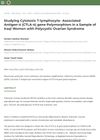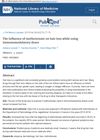 2 citations,
August 2019 in “Asian journal of pharmaceutical and clinical research”
2 citations,
August 2019 in “Asian journal of pharmaceutical and clinical research” Cinnamon bark extract may help prevent weight loss and hair loss in breast cancer patients during chemotherapy and is safe to use.
 62 citations,
February 2011 in “Expert review of dermatology”
62 citations,
February 2011 in “Expert review of dermatology” Scalp cooling can reduce chemotherapy-induced hair loss and should be available in all hospitals.
 June 2018 in “Journal of Clinical Periodontology”
June 2018 in “Journal of Clinical Periodontology” Finasteride may cause gum problems, but stopping the drug can improve these issues.
[object Object]  January 2019 in “Przegląd Dermatologiczny”
January 2019 in “Przegląd Dermatologiczny” Chemotherapy with docetaxel can cause painful nail and skin side effects that may lead to stopping treatment.
 September 2021 in “Han'gug mi'saengmul saengmyeong gong haghoeji/Han-guk misaengmul saengmyeong gonghak hoeji”
September 2021 in “Han'gug mi'saengmul saengmyeong gong haghoeji/Han-guk misaengmul saengmyeong gonghak hoeji” Tetrathelmis tetrathele extract may help prevent hair loss and improve scalp health.
32 citations,
May 2018 in “Journal of the American Academy of Dermatology” Skin reactions from cancer treatments might predict how well the treatments work.
50 citations,
May 2021 in “Frontiers in immunology” Certain immune cells contribute to skin autoimmune diseases, and some treatments can reverse hair loss in these conditions.
 9 citations,
January 2014 in “Annals of Dermatology”
9 citations,
January 2014 in “Annals of Dermatology” Some breast cancer patients on hormonal therapy may develop male or female pattern hair loss, which can sometimes be improved with topical treatments.
 1 citations,
January 2017 in “Current Dermatology Reports”
1 citations,
January 2017 in “Current Dermatology Reports” Early baldness in men may indicate risks for obesity, metabolic syndrome, insulin resistance, and heart disease, similar to women with PCOS. Alopecia areata is often linked with autoimmune diseases and mental health issues. Certain hair disorders are due to genetic issues, and chemotherapy can cause hair loss through specific biological pathways. Iron deficiency's link to hair loss is still disputed.
72 citations,
November 1997 in “Clinics in dermatology” Vitiligo is a skin condition causing white patches, likely due to an autoimmune issue.
 April 2021 in “Sohag Medical Journal”
April 2021 in “Sohag Medical Journal” Alopecia areata is an autoimmune condition causing hair loss, linked to genetic factors and immune system issues, with no cure yet.

Any medication can cause skin reactions, some due to allergies and others due to dosage or genetic factors.
 2 citations,
December 2019 in “Al-ʻulūm al-ṣaydalāniyyaẗ”
2 citations,
December 2019 in “Al-ʻulūm al-ṣaydalāniyyaẗ” The CTLA-4 gene change studied does not affect Polycystic Ovarian Syndrome in the women tested.
 49 citations,
August 2018 in “International Journal of Dermatology”
49 citations,
August 2018 in “International Journal of Dermatology” Topical JAK inhibitors may help treat alopecia universalis by promoting hair regrowth.
 February 2019 in “PubMed”
February 2019 in “PubMed” Methotrexate treatment often causes hair loss.
 97 citations,
September 2006 in “Pharmaceutical Research”
97 citations,
September 2006 in “Pharmaceutical Research” No treatment fully prevents hair loss from chemotherapy yet.
 September 2020 in “Acta Scientific Cancer Biology”
September 2020 in “Acta Scientific Cancer Biology” Personalized treatment based on detailed tumor analysis successfully managed and reduced the patient's aggressive hair follicle cancer.
1 citations,
January 2023 in “PubMed” Urtica dioica extract may help treat androgenic skin diseases by reducing a specific gene's activity.
 15 citations,
January 2018 in “Acta dermato-venereologica”
15 citations,
January 2018 in “Acta dermato-venereologica” Skin treatment can lower life quality for patients with skin conditions.
 October 2020 in “Veterinary Dermatology”
October 2020 in “Veterinary Dermatology” New treatments and diagnostic methods for various animal skin conditions showed promising results.

Use the least toxic, most specific treatments for skin diseases, considering side effects and individual patient needs.
 20 citations,
January 2012 in “International journal of trichology”
20 citations,
January 2012 in “International journal of trichology” Steroids are the best treatment for Alopecia Areata with few side effects.
 11 citations,
November 2012 in “Seminars in Cutaneous Medicine and Surgery”
11 citations,
November 2012 in “Seminars in Cutaneous Medicine and Surgery” Genetic factors affect hair loss, and molecular testing may help predict, diagnose, and treat it.
[object Object]  11 citations,
June 1996 in “Nutrition”
11 citations,
June 1996 in “Nutrition” Vitamin D3 may prevent hair loss from chemotherapy, but side effects and cancer cell protection are concerns.
 4 citations,
July 2008 in “British journal of dermatology/British journal of dermatology, Supplement”
4 citations,
July 2008 in “British journal of dermatology/British journal of dermatology, Supplement” Poor response to topical immunotherapy in alopecia areata patients is linked to impaired cell responses.
 2 citations,
October 2021 in “Egyptian Journal of Chemistry”
2 citations,
October 2021 in “Egyptian Journal of Chemistry” Iron nanoparticles made from pumpkin extract effectively treated burns and promoted healing in mice.
 95 citations,
November 2018 in “Australasian journal of dermatology”
95 citations,
November 2018 in “Australasian journal of dermatology” Alopecia areata treatment varies, with no optimal method established yet.
 August 2021 in “Research Square (Research Square)”
August 2021 in “Research Square (Research Square)” Borneol Essential Oil could be a natural and safe acne treatment.
 18 citations,
February 2016 in “The Journal of Clinical Endocrinology and Metabolism”
18 citations,
February 2016 in “The Journal of Clinical Endocrinology and Metabolism” Advancements in male reproductive medicine are ongoing, but more research and improved treatments are needed in several areas.
31 citations,
July 2021 in “ImmunoTargets and therapy” Alopecia areata is an incurable autoimmune condition causing hair loss, with research aiming for better treatments.
























